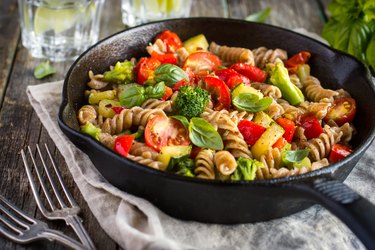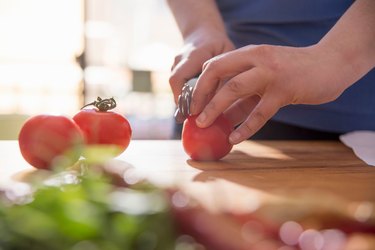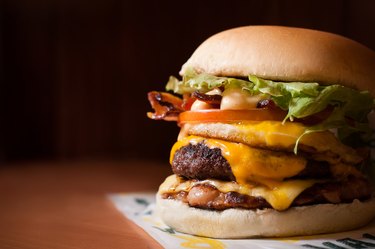
Being told you have prostate cancer can be a frightening experience. It's easy to feel overwhelmed and somewhat helpless in the face of a cancer diagnosis. But your diet is one thing you can control.
There's no single prostate cancer diet, but you can tailor what you eat to help you manage the disease.
Video of the Day
Video of the Day
Why Diet Is Important When You Have Prostate Cancer
While no food can cure prostate cancer, a healthy diet is one of your most important allies in living well with the disease.
That's because eating nutrient-rich foods can boost your energy levels, lower your risk of infection and help you handle treatment side effects, according to the American Cancer Society.
A plant-based diet may be your best bet, according to a July 2018 review in Cancer Therapy & Oncology, because it has the potential to lower prostate-specific antigen (PSA) levels. PSA is a protein produced by the prostate, and high levels are linked with prostate cancer, according to the Mayo Clinic.
Whitney Christie, an oncology dietitian in Fredericksburg, Virginia, recommends following guidelines for the New American Plate, developed by the American Institute for Cancer Research.
"This method focuses on having two-thirds (or more) of your plate filled with plant-based options like fruits, vegetables, whole grains or beans," she says. "The other third (or less) of your plate should be animal protein."
With that in mind, here are a few foods to add to your diet, along with a few to limit or avoid.
Related Reading
3 Healthy Foods to Eat After a Prostate Cancer Diagnosis

1. Foods High in Antioxidants, Like Fruits and Veggies
Antioxidants are a large group of molecules that help neutralize the free radicals that can overwhelm the body during cancer.
Some antioxidants have familiar names, like vitamins C, E and A, but there are many more that cannot be bottled up and sold as a supplement.
When looking for foods high in antioxidants, look no further than the produce section. Bright, colorful veggies and fruit are great sources.
"I encourage all my patients to eat fruits and vegetables," Christie says, "aiming for at least five servings a day from all colors of the rainbow."
2. Foods Rich in Lycopene, Like Canned Tomatoes
This might seem like an odd one, since processed foods aren't usually the recommendation when it comes to healthy eating. But one of the nutrients studied in cancer prevention and treatment is lycopene. Higher levels of lycopene in the diet are associated with a lower risk of cancer and may also inhibit the growth of tumors in those who have prostate cancer, according to February 2014 research in the Journal of the National Cancer Institute.
The lycopene in cooked tomatoes is absorbed better by the body, and since canned tomatoes are essentially cooked, you'll get more lycopene this way, according to the Tomato Wellness Council.
You can also get lycopene by eating pink grapefruit and watermelon. And of course, if raw tomatoes are more your style, eat those too.
Related Reading
3. High-Fiber Foods, Like Oatmeal and Quinoa
High-fiber foods, and high-fiber grains in particular, are a good choice. A November 2012 study in Prostate Cancer found that the high amount of fiber in grains may be protective against aggressive prostate cancer.
Fiber of all types also helps to enrich the gut by feeding and diversifying your good bacteria. Maintaining your gut microbiome could keep your immune system in tip-top shape and also help decrease inflammation. Inflammation has been linked to cancer growth, according to an August 2020 article in Gut.
High-Fiber Grains
Food | Grams of fiber |
Whole-wheat spaghetti (1 cup) | 6 |
Pearled barley (1 cup) | 6 |
Bran flakes (3/4 cup) | 5.5 |
Quinoa (1 cup) | 5 |
Instant oatmeal (1 cup) | 5 |
Air-popped popcorn (3 cups) | 3.5 |
Brown rice (1 cup) | 3.5 |
Whole-wheat bread (1 slice) | 2 |
4 Foods to Limit or Avoid When You Have Prostate Cancer

1. Undercooked Food
In general, you first want to make sure you're heeding food safety rules, since you don't want to deal with a foodborne illness on top of cancer. This is especially important if your cancer is in an advanced stage or you're undergoing more aggressive treatments, since these can make your immune system weaker and more vulnerable to these illnesses.
Always cook your meat to the proper temperature, and avoid raw meats and fish.
In addition, you should always wash your fruits and vegetables, and steer clear of the buffet line, according to the American Cancer Society.
2. Red Meat
Red meat is the food most consistently linked with prostate cancer, according to the July 2018 Cancer Therapy & Oncology review. Indeed, the Prostate Cancer Foundation (PCF) recommends keeping red meat to a minimum in your diet, since studies have linked it to an increased risk of developing advanced prostate cancer.
Red meat includes beef, veal, lamb, mutton and pork.
"Red meats should be eaten in moderation — no more than 18 ounces a week," Christie says. That breaks down to six 3-ounce servings, each about the size of a deck of cards.
Avoid charred meat especially, since it has been shown to have cancer-promoting properties, according to the PCF.
Better protein-rich choices include fish, lean poultry (think: skinless chicken breast) and plant-based options like nuts and beans, per the PCF.
3. Low-Fiber Foods
Foods high in fiber are your best bet, as mentioned above. When you eat low-fiber foods, like white bread and pasta, white rice, snack foods and desserts, you crowd out the space in your diet for fruits, vegetables and whole grains.
4. Highly Processed Foods and Drinks
"In terms of cancer prevention and survivorship, the recommendations from the American Institute for Cancer Research do suggest limiting consumption of fast foods or other foods high in fats, starches or sugars," Christie says.
She also recommends that her patients limit sugar-sweetened drinks (like soda) and processed meats, including bacon, sausage, hot dogs, lunch meat and ham.
Should You Be Taking a Vitamin or Supplement?
It's best to get your vitamins from food sources rather than supplements, according to the PCF, which recommends a diet rich in fruits, vegetables and whole grains.
Where to Turn for Help With Your Diet
If you haven't already, ask your doctor for a referral to see a dietitian. Many cancer treatment facilities have a board-certified specialist in oncology nutrition to help guide you through your cancer nutrition needs.
Christie stresses the need for individualized nutrition. "Depending on where the individual with prostate cancer is in their journey and the side effects they may experience because of their treatment, sometimes adjustments to foods or your daily food routine may be necessary to ensure optimal nutrition."
Meeting with an oncology dietitian can address allergies, medication interactions and how to get the best nutrition for your cancer treatment plan.
Some people have found success by following certain types of diets, such as the macrobiotic diet, which is essentially a diet high in fruits, vegetables and whole grains — however, it has been known to also restrict important nutrients too. If this is a diet you are considering, speaking with a dietitian is crucial to make sure you're meeting your unique nutritional needs.
- National Cancer Institute: Prostate Cancer Treatment
- Mayo Clinic: "PSA Test"
- National Cancer Institute: "Prostate Cancer, Nutrition, and Dietary Supplements"
- Journal of the National Cancer Institute: "Dietary Lycopene, Angiogenesis, and Prostate Cancer: A Prospective Study in the Prostate-Specific Antigen Era
- Gut: "The Role of Gut Microbiota in Cancer Treatment: Friend or Foe? "
- Cancer Therapy & Oncology: "A Plant Based Diet Prevents and Treats Prostate Cancer"
- American Cancer Society: "Food Safety During Cancer Treatment"
- The Lancet Oncology: "Carcinogenicity of Consumption of Red and Processed Meat"
- Prostate Cancer: "Intake of Grains and Dietary Fiber and Prostate Cancer Aggressiveness by Race"
- Harvard Medical School: "Cancer and Diet, What's the Connection?"
- American Cancer Society: "Benefits of good nutrition during cancer treatment"
- Tomato Wellness Council: "Science Library: Tomato Wellness"
- Mayo Clinic: "Chart of High-Fiber Foods"
- Prostate Cancer Foundation: "Prostate Cancer Diet"
Is this an emergency? If you are experiencing serious medical symptoms, please see the National Library of Medicine’s list of signs you need emergency medical attention or call 911.